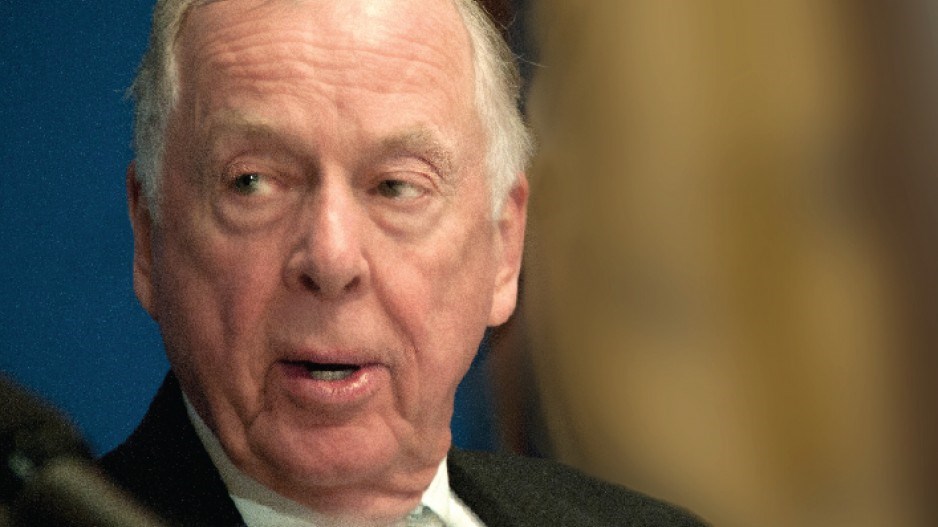Multimillionaire Texas energy tycoon Thomas Boone Pickens Jr., better known as T. Boone Pickens, has earned a day off.
Over the past 63 years, he has amassed an enormous fortune. His empire, currently pegged at approximately US$950 million, has included significant oil and gas interests, mining firms and auto parts manufacturers.
He’s given hundreds of millions to his Oklahoma State University alma mater, established the T. Boone Pickens Foundation that supports a poor inner-city neighbourhood in Dallas and lectured across the United States.
His is a resumé hardly in need of any more additions. But the outspoken 85-year-old has no plans to take it easy.
A seat on the bench, it seems, is no seat at all.
“Someone told me once that in retirement you can do all things you always wanted to do. But I’m doing exactly what I want. I want to go to work every day,” said Pickens, reached by phone in the Dallas office of BP Capital Management, a private investment firm he founded in 1997.
When he isn’t travelling, Pickens starts his day promptly at 6 a.m. with a call to the office. He talks to two employees that have already collected all the overnight oil and gas data. The call lasts about 30 minutes.
Next stop is the treadmill and a workout with his trainer of 23 years.
“Arms and back were yesterday, tomorrow will be legs,” said Pickens. “And just a little while ago I called my wife – we were going to go out to dinner, but she was busy. So, we both decided to forget it, we’ll just eat something at home. That’s kind of a normal day.”
The normal won’t last too long, however.
Over the next few weeks, Pickens will travel to New York, Boston, Washington, D.C., California and British Columbia, where he’s scheduled to give a featured talk on February 27 at the Surrey Regional Economic Summit.
Greg D’Avignon, president and chief executive officer of the Business Council of British Columbia, will moderate Pickens’ speech.
D’Avignon said he wants to hear about what inspires Pickens to continue in business.
“Mr. Pickens has got a long history in energy, but I think the audience would be interested in what drives him as an entrepreneur. He is obviously not in his twenties, but he continues to be very enthusiastic around building companies and building wealth and going after opportunity,” said D’Avignon.
“So, what is it that drives people like that?”
In the hour-long session, Pickens will also outline his oft-discussed Pickens Plan, a policy roadmap drafted in 2008 that he believes will lead to energy independence for the United States. Pickens has long railed against the U.S. importing oil from the Organization of Petroleum Exporting Countries (OPEC), some of whose members he believes to be enemies of the United States. OPEC oil accounts for more than half of the U.S.’s daily net oil imports of 7.4 million barrels.
“Some of the money that we are spending to purchase oil from the Middle East gets in the hands of the Taliban,” said Pickens. “We can cut that off.”
In the sweeping plan, Pickens advocates for a greater use of natural gas and an expansion of renewable energy sources such as wind and solar power. The plan has been divisive.
Some environmentalists have praised its support of wind power; others have derided it for enthusiastically promoting natural gas, an industry from which Pickens stands to profit.
Pickens sits on the board of directors of Clean Energy Fuels Corp. (Nasdaq:CLNE), a company that evolved out of a firm he founded called the Pickens Fuel Corp.
But certain planks of the Pickens Plan haven’t always been kind to its author.
For instance, a failed wind farm project cost him nearly US$200 million after natural gas prices plunged and crushed the near-term economics of wind power sales.
Losses aside, Pickens remains convinced a diversity of sources is the long-term solution to meeting future energy demands.
“The price of natural gas is too cheap right now to do much with wind, and solar is too expensive,” he said. “But they are forms of energy [that] we do need to keep up with and work on.”
In the short-term, Pickens said the U.S. must approve the controversial Keystone XL pipeline, which, if built, would carry up to 830,000 barrels of crude oil per day from the Alberta oilsands to refineries on the U.S. Gulf Coast.
Ottawa continues to champion Keystone, but U.S. President Barack Obama has repeatedly delayed the project.
That hand- wringing, according to Pickens, has shown a “lack of leadership” on the part of Washington.
“I say in speeches here in the United States, ‘You all don’t realize how good friends the Canadians are.’ This isn’t a hard decision for the United States to make. And they still have not given the Canadians an answer. I said you all act like Canada is in Rhode Island. I said, ‘Hell, it’s not a state; it’s a sovereign country.’ I had one of our congressmen say ‘I don’t like the emissions out of Fort McMurray.’
“I say it doesn’t make any difference whether you like ’em or don’t like ’em. I said the oil is gonna go somewhere, and I don’t want it to go the West Coast. Once it is set up to export to Asia, well, it’s over for us.” •




